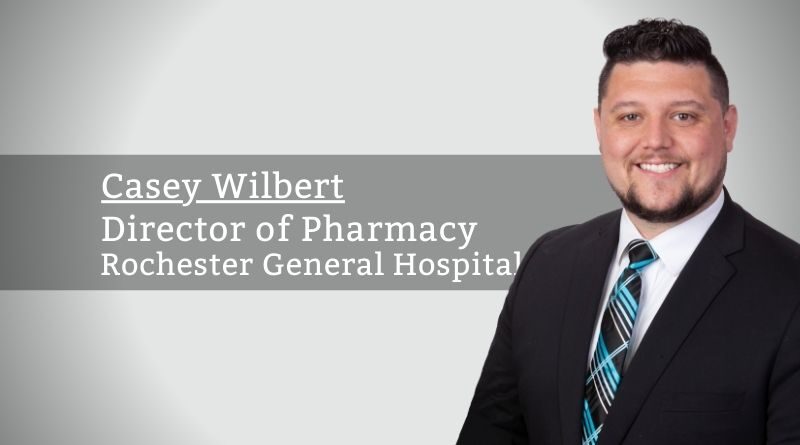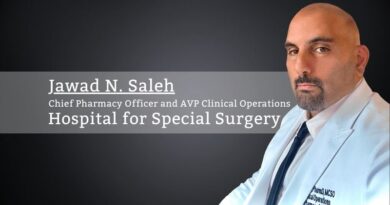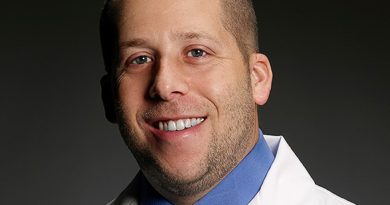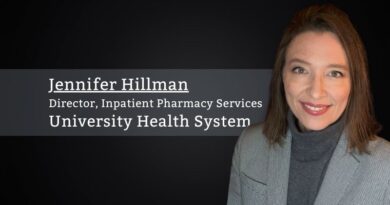Leading the Change: Empowering teams amidst a changing healthcare landscape
By Casey Wilbert, PharmD, MBA, BCPS, Director of Pharmacy, Rochester General Hospital
Pandemics, shortages, and change, oh my! As everyone has realized over the past few years, healthcare is at a pivotal point of change and must adjust accordingly. We have seen and normalized many things we never thought we would. We have stretched our teams to their limits and there doesn’t seem to be an end.
All this being said, we as leaders have an opportunity to make meaningful changes impacting how we take care of the people who take care of our communities. We have the chance to re-write how we lead teams, though to do so, it is going to take some change in mindset. As leaders, we must work with our frontline teams to better understand their struggles and act on them. Gone are the days of leaders being able to stay in their offices. It is time to get back to hands-on work and a genuine desire to learn what our people need.
This sounds like a lofty goal, maybe even unrealistic. The burden on leadership is tremendous. We are consistently being asked to complete any number of projects and tasks…how can we fit everything into a 40, 50, 60 (or more) hour work week? If we start with maybe one focused project and utilize existing resources within your organization, we can start to approach the unthinkable and make it happen. We can leverage the feedback of our teams, bring them into the decision-making process and develop programs that will be meaningful and impactful.
As leaders, we are challenged to adapt, adjust and inspire in a rapidly changing industry. We must ensure that we care for those who care for patients…our frontline workforce.
Recognizing good work
As leaders, one of the most basic needs of our team members is to recognize their work. I believe that organizations often miss or don’t focus enough on is the power of peer recognition. Since I was in my first leadership role, I have made it a requirement that we don’t end our team huddles without peer recognition. We usually have a few people speak up, but often, there are awkward moments of silence until a member of the leadership team recognizes someone. So I started asking what we could do to better facilitate recognition amongst peers and how could we get people to speak up? I quickly received some crucial pieces of feedback 1) people don’t feel comfortable speaking in front of a large group, 2) throughout the week, great work can get forgotten/lost in the busyness of the day, 3) if we change how we recognize people, it needs to be easy and convenient. Though much of this was not unexpected, determining the “how” required our leadership team to get creative and innovate. Ultimately, we came up with a program we affectionately call “Real-Time Recognition”. We utilize REDCap, a survey and project management tool already in use in several other areas within our organization. Our program is a few simple questions and allows the recognizer to fill it out, on their phone (utilizing a QR code) or computer, in less than a minute.
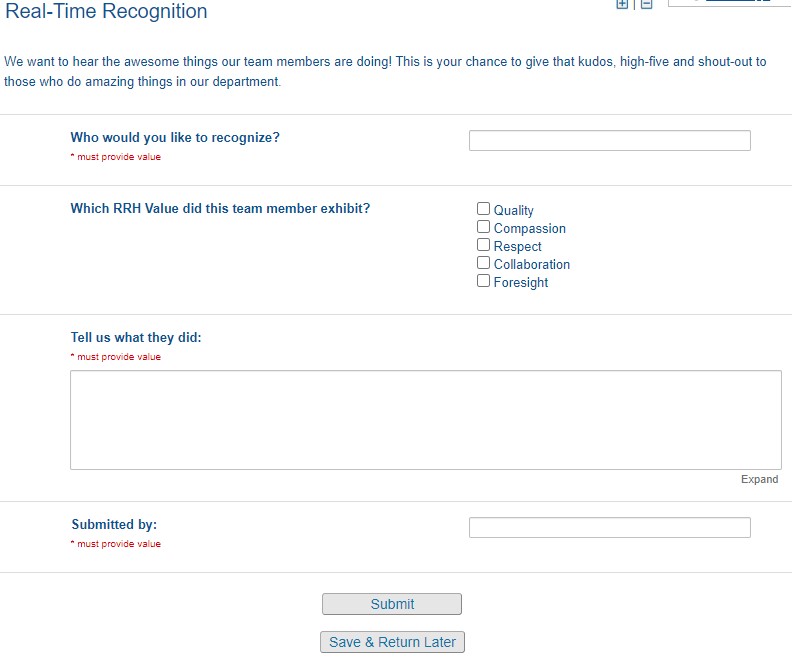
At the end of our weekly full team huddle, leadership will share the shout-outs submitted for the week with the team. We have heard great things from our team and have tremendously increased peer recognition.
Diversity, Equity and Inclusion (DEI)
One of the most important topics of our times is the development of DEI programming within organizations. As a pharmacy leadership group at our organization, we recognized that we had a significant opportunity to support our teams in creating environments where they felt safe, listened to and celebrated. Our first piece of development was to train our leaders to better understand what DEI is and why it must become enculturated within our departments. To accomplish this, every pharmacy leader within our organization attended training led by the DEI Office leadership. After completion, we quickly recognized that we needed to do more with our frontline team members to increase engagement and ensure that DEI training did not stop with our leadership team. Partnering with the DEI Office, we developed a program where leadership is provided with resources (videos, articles, posters, etc.) to discuss each week at their team meetings. Our team members have the chance to contribute to the conversation and discuss any thoughts they have, moments of realization, or what they learned from that week. We allow our team members time to provide feedback on how the program is going and what we can do to improve. We have learned more about each other, how we can foster welcoming and safe environments, and the world around us from people who may not look and think like us.
Bringing it all together
Change is hard…really hard. We have all been abruptly placed into an environment that looks different than it was prior to the pandemic. Maybe it even looks so different that you are questioning if it is still what you are called to do. There is still so much unknown about how healthcare will look in the future. What we know is that the only constant is change. As leaders, we are challenged to adapt, adjust and inspire in a rapidly changing industry. We must ensure that we care for those care for patients…our frontline workforce. My hope is that you all start to shift the lens in how you look at leadership. How can you better engage? How can you better listen and hear? How can you better support and inspire the teams you are entrusted with? One of my favorite quotes is from Teddy Roosevelt which says, “The greatest gift life has to offer is the opportunity to work hard at work worth doing” the work of healthcare, for us, is the work worth doing…let’s inspire others to feel the same.
